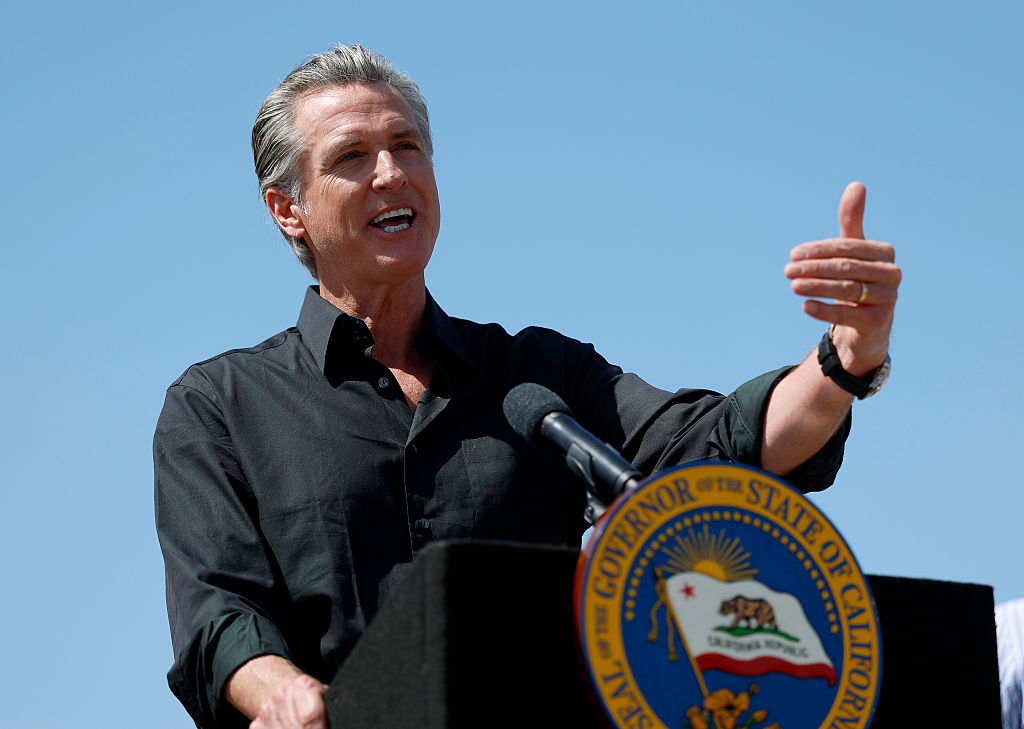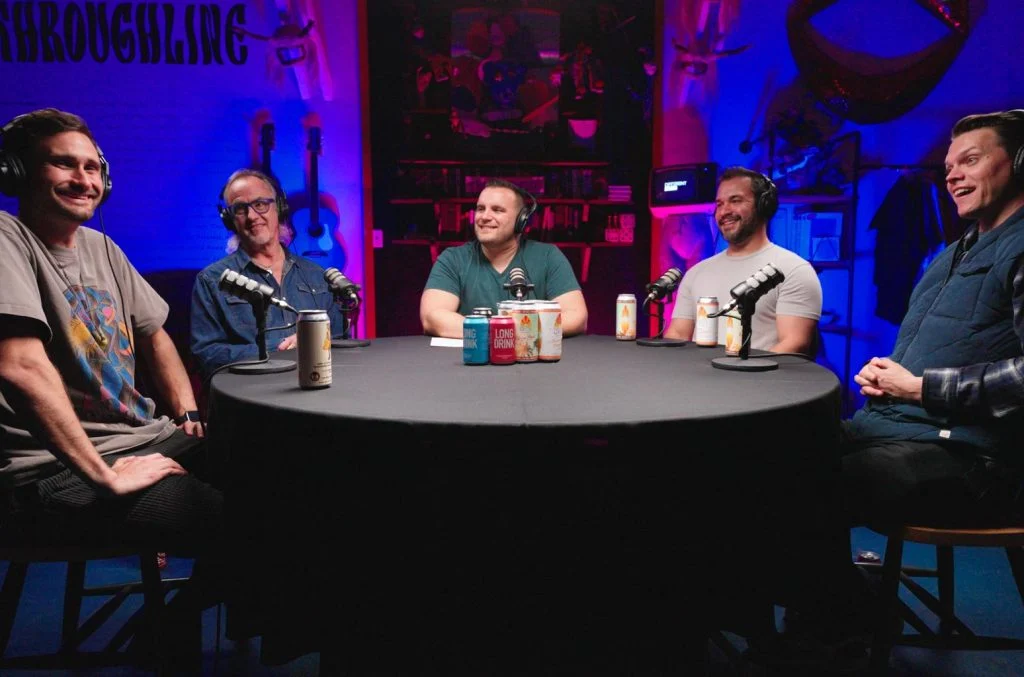California
Source: Justin Sullivan / Getty
Before the immigration protests in California began earlier this month, California Governor Gavin Newsom was just another face in the already crowded public imagination of Democratic hopefuls.
The vivacious and personable Newsom had been your quintessential liberal governor that Republicans hate. He didn’t just support a woman’s right to get an abortion, he signed legislation allowing those in neighboring states like Arizona to be able to travel to his state seeking abortions without fear.
Once protests began in California earlier this month, the always-ready-for-violence commander in chief decided that he was going to release the National Guard because he can’t stand when people exercise their freedoms against his tyranny. This placed a public spotlight on the liberal state and its governor. By not acquiescing to the president’s demands, Newsom has become all the things people wished the Democratic members of Congress would be. He’s been sharp, stern and fearless. If this were a rap battle, Newsom’s been going bar for bar with the president with no signs of letting up.
When President Trump took to his bootleg version of X threatening to withhold federal funding to the third largest state in the country, Newsom floated the idea of withholding California’s federal taxes.
“We pay over $80 BILLION more in taxes than we get back” from the federal government, Newsom posted on X. “Maybe it’s time to cut that off.”
Trump, who loves to make up nicknames for those that don’t follow his commands, began calling Newsom, “New-scum” and claimed that he should have border czar Tom Holland arrest the governor, Newsom responded: quit talking about it and be about it, wit your broke….
Ok, fine, he didn’t say those words exactly but he didn’t back down and he noted that the Trump presidency was completely off the rails.
“The President of the United States just called for the arrest of a sitting Governor,” Newsom posted on Instagram along with a video of Trump’s comments, ABC News reports. “This is a day I hoped I would never see in America. I don’t care if you’re a Democrat or a Republican, this is a line we cannot cross as a nation — this is an unmistakable step toward authoritarianism.”
“These are the acts of a dictator, not a President,” Newsom posted on X.
While Gavin Newsom has never publicly noted that he has any intention to run for higher office, it would be incredibly naive to ignore the fact that Gavin Newsom is having a moment.
If a doctor went into a lab to create the anti-Trump prototype he would make Gavin Newsom. Trump has failed at just about every business he ever lent his name to, while Newsom was a successful businessman who owns a highly profitable winery and hospitality company. He didn’t just come down an elevator in his outdated luxury digs and declare his run for office stoking the fears and racism that set the country back decades, Newsom came up the hard way. He began his political career in 1996 when he was appointed to the San Francisco Parking and Traffic Commission. The next year, he was elected to the Board of Supervisors. In 2003 he was elected mayor of San Francisco and served in that position until 2011.
Newsom would go on to serve as lieutenant governor of California, from 2011 to 2018. He was elected as the governor of California in 2018 and was re-elected in 2022.
In resisting the evils of tyranny and white supremacy ideology, Newsom has become the face of resistance against an authoritarian regime that has been hellbent on unleashing military force on its own citizens.
And this might be the biggest fight of Newsom’s political career.
D-riders from the Trump regime have all jumped into the fray. Speaker of the House Mike Johnson has called for Newsom to be tar and feathered. Sen. Markwayne Mullin took to X to play in the governor’s face about violence caused by massive police presence during what were peaceful protests to which Newsom shot back: “If you want to discuss violence, let’s start with your state’s murder rate – which is 40% higher than California’s.”
And then there was White House Communications director Stephen Cheung who took to social media to call Newsom “the biggest cuck in American politics,” claiming that he’s allowed “domestic terrorists to desecrate and defile communities across CA.”
And yeah, that happened.
Newsom has emerged as a political stalwart by just not being messy and living for drama. He’s merely continued his one message to the resident’s of his state:
“Los Angeles: don’t take Trump’s bait. Trump wants chaos and he’s instigated violence,” Newsom said in a post on X. “Stay peaceful. Stay focused. Don’t give him the excuse he’s looking for.”
As it stands, the Trump administration deployed 2,000 National Guard and 700 U.S. Marines in the United States of America to stop protests against ICE raids that were going on at children’s graduations and court appearances. Oh, you didn’t know that part? Yep, ICE was running up in full masks and detaining people who were showing up to immigration hearings and using gatherings like graduations to arrest folks and pull them away from their family. Because this mass deportation drama has never been about “Making America white again” but that’s another story for another time.
Governor Gavin Newsom and Attorney General Rob Bonta filed a lawsuit against the Trump administration for escalating chaos and violence by sending in the military without consent or input from the governor.
Newsom is like Batman at this point: a rich man with a tool belt and a vengeance against a regime and he’s using every available weapon in his arsenal to fight back.
Sometimes a hero isn’t the one we want so much as the one we have. Gavin Newsom has become the face against authoritarianism. He is the anti-Trump. And sometimes all you have to be is the one person willing to say something in a room full of people who are sitting on their hands.
And just like that you become the face of a movement.
HipHopWired Featured Video
The producers of four independent California festivals are offering a limited edition ticket that provides general admission access to the 2025 edition of each event.
Dubbed the “indepenDANCE Pass” the ticket is on offer for $599, approximately $1,400 less expensive than the cost of buying four separate tickets to each festival. A total of 100 indepenDANCE Passes are currently available, with profits split evenly between each event.
The passes are part of a campaign to bring attention to the state of independent music festivals, which have struggled following the pandemic due to rising costs of goods and services. The founders of each of the four festivals involved with the IndepenDANCE Pass recently gathered for a longform conversation about the state of the independent side of the festival industry.
Trending on Billboard
“Independent festivals have always been about community, and now we’re taking that to the next level,” Same Same But Different co-founder and CEO Brad Sweet says during the talk. “We pour everything we have into creating spaces where people can truly connect, dance freely, and experience something real, and now we’re uniting to create something bigger than any one festival, a collective that strengthens the entire scene and gives our community more access, more connection, and more unforgettable experiences across the festival season. By coming together, we’re making sure independent festivals don’t just survive, but evolve and flourish for years to come.”
Featuring dance, funk, global music and more, Joshua Tree Music Festival happens both this May 15-18 and October 9-12 (the pass is good for just one of the events) in Joshua Tree, Calif. Happening in Lake Perris, Calif. this Sept. 26-28, Same Same But Different has previously featured artists including Griz, Big Gigantic, Polo & Pan and Louis the Child, with the 2025 lineup to be announced in the coming months.
Meanwhile the longstanding house and techno festival Desert Hearts 2025 happens July 3-7 in Flagstaff, Ariz. The electronic-oriented Northern Nights, which has this year partnered with Dirtybird Campout, happens Cook’s Valley Campground in Northern California on July 18-20, with the lineup also to be announced in the coming months.
HipHopWired Featured Video
A$AP Relli took the stand on Tuesday (Jan. 28) during former friend A$AP Rocky’s shooting trial, revealing more details about the 2021 incident. During his time on the stand, A$AP Relli claims he allegedly demanded that A$AP Rocky use the gun at the center of the matter in a show of bravado although Relli reportedly testified he never saw a firearm on Rocky’s person before their confrontation.
TMZ reports that A$AP Relli, real name Terell Ephron, took the stand and shared his side of the story regarding the alleged incident. Relli and Rocky, real name Rakim Mayers, were childhood friends in New York and came up together as Rocky rose the ranks in music and fashion as part of the A$AP Mob collective. Relli says the issues began when a day before the November 6, 2021 shooting, he overheard a call between Rocky and A$AP Bari that was disparaging toward him and the longtime friendship fizzled from there.
The next day, Reli and Rocky planned to meet in Hollywood and the testimony from Relli claims that Rocky arrived with two other individuals with the idea of hashing out their differences in person. During the testimony, Relli claims he told Rocky, “You better use that sh*t, what the f*ck you got a gun for?” and added, “I was willing to die for my respect. If this is what you want to do, I still have my dignity.”
Relli claims he was grazed on the knuckle after Rocky fired at him. Rocky’s attorney says that the gun in the matter was a stage prop and therefore could not have fired a bullet nor were there casings found.
Rihanna, the mother of Rocky’s children, was in the gallery during the testimony in a show of support. Also taking the stand was an LAPD officer Tommy Zizzo, the son of Erika Jayne who starred in The Real Housewives of Beverly Hills franchise.
A$AP Rocky is facing two felony counts of assault with a semiautomatic firearm and faces a maximum of 24 years behind bars if the trial leads to a conviction. Rocky has previously rejected a plea deal.
—
Photo: Getty
HipHopWired Featured Video
Madlib, a veteran music producer and one of the more notable names in Hip-Hop, lost his home to the wildfires ravaging portions of California that has displaced thousands of residents and all but destroyed longstanding neighborhoods. Madlib’s hometown of Oxnard was also under threat of the blaze that claimed him family’s home and is now launching a fundraiser to help recover what was lost.
On Instagram, Madlib, born Otis Jackson Jr., shared details regarding the fundraising effort along with an image of his damaged home. The caption, which we’ll share below, details what the producer hopes to gain from his supportive fans.
From Instagram:
We are reaching out with heavy hearts to ask for your support in helping legendary producer Madlib and his family after losing their home, decades of music, and equipment in the devastating LA fires. Your donation, no matter the amount, will provide assistance to help Madlib with immediate personal needs, essentials like clothing, temporary housing, transportation costs and the tools Madlib needs to continue creating the music that has touched so many lives. 100% of your donations are tax deductible and will go directly to Madlib and his family. continue creating the music that has touched so many lives. Thank you in advance for your love, prayers and support.
Madlib, who has released music since the 1990s, has worked alongside the likes of the late J Dilla of Slum Village fame (as JayLib), the late MF DOOM (as Madvillain), Freddie Gibbs, and has produced for Kanye West, Erykah Badu, De La Soul, his young brother producer-rapper Oh No (Michael Jackson), and Anderson .Paak among others.
The link for the fundraiser can be found by clicking here.
https://www.instagram.com/madlib/p/DExf4kMJR-7/
—
Photo: Getty
HipHopWired Featured Video
Source: MediaNews Group/Orange County Register via Getty Images / Getty
Donald Trump attacked California Governor Gavin Newsom, blaming him for the deadly wildfires in Los Angeles and demanding he step down.
As the nation is gripped by scenes of the deadly wildfires plaguing Los Angeles over the past few days, President-elect Donald Trump’s ire is reserved for California Governor Gavin Newsom. In a late-night post on his Truth Social platform, Trump took to his usual tactic of attack in using a derogatory nickname for the governor: “One of the best and most beautiful parts of the United States of America is burning down to the ground. It’s ashes, and Gavin Newscum should resign. This is all his fault!!!”
In a follow-up post earlier that evening, Trump alleged that Newsom’s policy of protecting the delta smelt, a small fish on the endangered species list, was a cause of restricting water flow. “Governor Gavin Newscum refused to sign the water restoration declaration put before him that would have allowed millions of gallons of water, from excess rain and snow melt from the North, to flow daily into many parts of California, including the areas that are currently burning in a virtually apocalyptic way,” he wrote. Izzy Gardon, Newsom’s director of communications, refuted that claim: “There is no such document as the water restoration declaration, that is pure fiction. The Governor is focused on protecting people, not playing politics, and making sure firefighters have all the resources they need.”
Governor Newsom was asked about Trump’s attack by CNN’s Anderson Cooper in an interview while both were in a neighborhood in the Pacific Palisades area where the fires were being fought. “People are literally fleeing,” Newsom said. “People have lost their lives, kids lost their schools. Families completely torn asunder, churches burned down, and this guy wanted to politicize it. I have a lot of thoughts and I know what I want to say – I won’t.” His office would reiterate that sentiment in a post on X, formerly Twitter, afterward which featured the interview.
Firefighters are combating five infernos in the areas surrounding Los Angeles, fueled by the intense Santa Ana winds which have reached gusts up to 100 miles per hour. Officials have said that so far, five people have died as a result of the fires with the tally expected to rise in the coming days. The Palisades, Eaton, Sunset, Hurst and Lidia fires have consumed over 28,000 acres to date.
HipHopWired Featured Video
Source: Carmen Mandato / Getty
2024 was an absolute struggle year for Drake as Kendrick Lamar systematically tore down his reputation, credibility, and popularity all in a matter of weeks (just sayin’), and now it seems like 2025 might not be much kinder, as the King of the North is having trouble moving his home out in California.
According to Newsweek, the “One Dance” artist is currently trying to sell his Beverly Hills home, which he purchased in March of 2022 only to put it back on the market in May of 2023. Originally shelling out $75 million for the 10-bedroom, 22-bath mansion, Drizzy was hoping to get back a little something on top and listed it for $88 million. Unfortunately, for him, it doesn’t seem like it’s garnering much interest. And Drizzy might have to take yet another L and sell the estate for a little less than his original asking price even, as Redfin says that median sale price in Beverly Hills is up 19.4% year-over-year.
Per Newsweek:
Redfin estimates that Drake’s house is worth approximately $69 million—about $6 million less than what the rapper paid for the property in 2022 and $19 million less than the current asking price.
The 24,757-square-foot home was initially owned by British singer Robbie Williams, who purchased the property in 2015 for just over $32 million. While Williams made over $42 million in the sale, Drake may have to take a $6 million loss if the home sells at its current $69 million valuation.
“I think it’s a hard sell,” Scott Gorelick, realtor at The Agency RE in Beverly Hills, told Newsweek.
According to Gorelick, Drake’s mansion sits outside the confines of a “true” Beverly Hills location, and those willing to pay that high of a price tag are typically home shopping on Billionaires Row in Malibu, Beverly Hills Proper or Bel Air, California.
Drizzy didn’t even cop a crib in the “true” Beverly Hills?! We’re shocked.
While most homes for sale in Beverly Hills only last roughly two months on the market, Drake’s home has been sitting for 248 days and counting with no buyers in sight as of yet. If Drizzy wants to move that house, he may have to lower his asking price a bit more and take a loss on his original $75 million investment.
Scott Gorelick, realtor at The Agency RE in Beverly Hills, told Newsweek: “…I think the price is closer to $60M in that location. Most of the 20 acres is unusable hillside and the views are not the A+ views that many other locations in Beverly Hills Proper or Bel Air will have. The home is also dated and needs a renovation.”
That Canadian man just can’t catch a break in the States.
HipHopWired Featured Video
CLOSE
Residents in the Westside, Los Angeles neighborhood of the Pacific Palisades, are threatened by a raging wildfire, leading Gov. Gavin Newsom to declare a state of emergency, and officials are looking to tame the blaze. The Pacific Palisades and other neighborhoods in California are under evacuation orders while the images from the wildfire have sparked both concern and debate online.
All across social media, the California wildfire has been discussed widely with users posting stirring photos and videos of the blaze. According to various reports from the likes of CBS News and the Los Angeles Times along with local outlets.
The fire began in Northwest Los Angeles on Tuesday (Jan. 7) morning and led to the evacuation of around 30,000 residents of the Pacific Palisades, which is nestled in the Westside region of Los Angeles County. High winds throughout the day spread the brush fire and CalFire reports that the blaze grew to a size of nearly 3,000 acres. Damages from the blaze are still being tallied along with the number of injuries, with widespread reports of heavy traffic and the like as residents look to flee to safety.
A second blaze broke on in Eaton in the Northern Los Angeles County neighborhood of Altadena and has reportedly torched over 1,000 homes according to CalFire officials. There was also a blaze titled the Hurst Fire that broke out in Los Angeles’ Sylmar neighborhood on Tuesday and touched several hundred acres.
Winds reached as high as 99 mph in the Altadena region and 84 mph at Hollywood Burbank Airport according to the National Weather Service. Santa Ana winds are typical in California but not usually this intense according to officials covering the weather event.
On X, formerly Twitter, residents enduring the wildfires are sharing their accounts of what they’re facing and giving detailed photos and video footage of the spreading damage. Those replies can be viewed below.
—
Photo: Getty
HipHopWired Featured Video
Marijuana is legal in the state of California on the medical and recreational level but there are still rules and regulations in place despite this. Authorities in a California town have a major marijuana mystery on their hands after discovering a massive stash of the plant with a reported street value of $100 million.
According to a report from local outlet VVNG, the San Bernardino County Sheriff’s Department entered a home in Oak Hills, just outside of Hesperia, Calif. On Monday, Dec. 9, the San Bernardino County Sheriff’s Department Marijuana Enforcement Team entered a home on a search warrant and discovered trash bags of cultivated and packaged products weighing around 90,000 pounds in total.
The property contained a large metal building that caught the eye of investigators, who later revealed the contents within via a statement.
Source: San Bernardino County Sheriff’s Department / SBCSD
From the San Bernardino County Sheriff’s Department website:
On Monday, December 9, 2024, the San Bernardino County Sheriff’s Department Marijuana Enforcement Team served a search warrant at a residence along the 5000 block of Honeyhill Road in Oak Hills. The five acre property contained a newly built, 120’ x 40’ metal building, along the east fence line. Inside this metal building, investigators located over 3000 trash bags filled with processed marijuana, stacked over 12 feet high, from end to end of the building. The trash bags each weighed approximately 30 to 50 pounds.
Over the course of two days, the Marijuana Enforcement Team, San Bernardino County Code Enforcement, and California Fish and Wildlife Department, seized 51 truck loads of processed marijuana totaling over 90,000 pounds, with a market value of over $100,000,000.00.
No arrests have been made thus far.
—
Photo: Getty/San Bernardino County Sheriff’s Department
HipHopWired Featured Video
Source: Michael Blackshire / Getty
Kendrick Lamar put the entirety of the greater Los Angeles area on his back with the track “Not Like Us” which was largely a diss of Drake and a call for West Coast unity. Leading this charge, Kendrick Lamar and a collective of other West Coast Hip-Hop artists are enjoying a resurgence that has put the culture at large on notice.
To best examine how the West has won in 2024, or at least why we believe they’re poised to do so, one only needs to look back to Future and Metro Boomin’s “LIKE THAT” single released in March from the pair’s WE DON’T TRUST YOU project that started the mudslinging between Kendrick Lamar and Drake, reaching a culture-shifting zenith by way of K-Dot’s explosive “Not Like Us” track.
The runaway success of “Not Like Us” remains a case study in timing, impact, and the power of directedness. There is no mystery in Lamar’s verse, no esoteric lines to parse, or prose that goes over the head. It is beyond clear that K-Dot’s Canadian rival was his target and that his relentless attacks dug into Drake’s character and image, with some in Hip-Hop crowning Lamar an absolute winner in their feud.
Adding to the layers, the video for “Not Like Us” was another celebration of greater Los Angeles with YG, Dot’s former boss at TDE Anthony “Top Dawg” Tiffith, Mustard, and DeMar DeRozan showing off regional pride via their appearances. It has come to the point that listening back to the relatively light jabs thrown on “LIKE THAT,” it remains baffling that the beef reached the heights that it did.
All of this has naturally overshadowed other crowning achievements from West Coast artists, and we’ll do our best to examine the year that was.
Groovy Q
Source: Billboard / Getty
ScHoolboy Q also dropped in March with his sixth studio album, Blue Lips, an album that we at Hip-Hop Wired reviewed and enjoyed immensely. To date, no other major Hip-Hop release has taken as many risks sonically as Blue Lips and further cements the legend of ScHoolboy Q as a streetwise but spiritually grounded lyricist. And as much as the production stood out on Blue Lips, the maestro in the middle of the maelstrom was always Q.
Vince Staples Continues Strong Run
Source: Erika Goldring / Getty
The buoyancy and chaotic energy of Blue Lips is not overtly present on Vince Staples’ sixth album, Dark Times, another example of the Long Beach native’s ability to find a reflective thread in even the starkest details surrounding his upbringing and rise to fame. Dark Times is not an overjoyous album, at least not overall. As the album reveals, Staples consistently presents himself as an artist who isn’t interested in being dissected or even understood. The album is an audio missive of someone who hopes to exist on their terms without the weight of expectations.
T Says He’s The Biggest Out The City Since Kenny
Source: Rodin Eckenroth / Getty
Tyler, The Creator —no longer just the talented, if foul-mouthed, producer-rapper that fronted the sprawling Odd Future crew — is now a veteran act and eight studio albums deep. His latest, Chromakopia, is an audio hodgepodge of all of Tyler’s sounds from rapping, singing, jazz, rock, you name it, it’s here. Continuing some of his chest-out rapping that appeared on CALL ME IF YOU GET LOST, T acknowledges K-Dot on “Rah Tah Tah,” signaling that the coast is unified. Chromakopia follows a concept that aims at rabid fans, tackles the abortion debate, and bashes the upkeep of fame. Some have crowned the record as the best to release this year.
Soul-O Hoe!
Source: Jason Armond / Getty
Ab-Soul’s sixth studio album, Soul Burger, was seen as a surprise considering the staggered release schedule that TDE typically employs. Dedicated to his good friend Doeburger, who passed away in 2021, Soul Burger finds the “Martin Luther King of Carson” paying homage to his friend and his roots while once again showing why he might be the strongest lyricist to emerge from the Top Dawg Entertainment camp.
New Kung Fu Kenny!
Source: Michael Blackshire / Getty
This brings us to the surprise release on Friday (November 22) of Lamar’s latest album, GNX, a body of work that seems to be a continuation of the sound examined on “Not Like Us” and features the full version of “squabble up,” a track we only heard as a snippet previously. GNX, at least on our first listen, doesn’t stick to a theme or sound and will take some time to take in all the finer points. That said, K-Dot shows off his extraordinary abilities, and the autobiographical “The Heart Pt. 6” is a highlight. And yes, there are shots at Drake, mentions of the Super Bowl, and maybe even a dig at Lil Wayne? You be the judge.
Other standout albums that highlighted the West Coast’s dominance this year include the likes of Jay Worthy and DāM FunK’s funky Magic Hour collaborative album, Tha Dogg Pound’s We All We Got, Larry June’s Doing It For Me, Big-Hit, Hit-Boy, and The Alchemist’s Black & Whites, and JasonMartin (FKA Problem) and DJ Quik’s Chupacabra.
We also got potent bar work from Planet Asia and his Trust The Chain II EP with 38 Spesh on production. TiRon and Ayomari’s The Adventures of TiRon & Ayomari, Thurz’s Yannick Koffi: In Time, and Casual’s Starbuster EP should all be included in this concise roundup.
Regional biases and arguments aside, it will be determined over time if the West Coast can sustain its momentum into 2025. But if 2024 is any indication, the West had a lot more than just something to say. It appears that the entire coast is ready to move together as a cohesive unit, and as the smoke continues to clear, any challenge to the respective thrones will be sufficiently met.
—
Photo: Getty
California Gov. Gavin Newsom vetoed a landmark bill aimed at establishing first-in-the-nation safety measures for large artificial intelligence models Sunday.
The decision is a major blow to efforts attempting to rein in the homegrown industry that is rapidly evolving with little oversight. The bill would have established some of the first regulations on large-scale AI models in the nation and paved the way for AI safety regulations across the country, supporters said.
Earlier this month, the Democratic governor told an audience at Dreamforce, an annual conference hosted by software giant Salesforce, that California must lead in regulating AI in the face of federal inaction but that the proposal “can have a chilling effect on the industry.”
Trending on Billboard
The proposal, which drew fierce opposition from startups, tech giants and several Democratic House members, could have hurt the homegrown industry by establishing rigid requirements, Newsom said.
“While well-intentioned, SB 1047 does not take into account whether an AI system is deployed in high-risk environments, involves critical decision-making or the use of sensitive data,” Newsom said in a statement. “Instead, the bill applies stringent standards to even the most basic functions — so long as a large system deploys it. I do not believe this is the best approach to protecting the public from real threats posed by the technology.”
Newsom on Sunday instead announced that the state will partner with several industry experts, including AI pioneer Fei-Fei Li, to develop guardrails around powerful AI models. Li opposed the AI safety proposal.
The measure, aimed at reducing potential risks created by AI, would have required companies to test their models and publicly disclose their safety protocols to prevent the models from being manipulated to, for example, wipe out the state’s electric grid or help build chemical weapons. Experts say those scenarios could be possible in the future as the industry continues to rapidly advance. It also would have provided whistleblower protections to workers.
The bill’s author, Democratic state Sen. Scott Weiner, called the veto “a setback for everyone who believes in oversight of massive corporations that are making critical decisions that affect the safety and the welfare of the public and the future of the planet.”
“The companies developing advanced AI systems acknowledge that the risks these models present to the public are real and rapidly increasing. While the large AI labs have made admirable commitments to monitor and mitigate these risks, the truth is that voluntary commitments from industry are not enforceable and rarely work out well for the public,” Wiener said in a statement Sunday afternoon.
Wiener said the debate around the bill has dramatically advanced the issue of AI safety, and that he would continue pressing that point.
The legislation is among a host of bills passed by the Legislature this year to regulate AI, fight deepfakes and protect workers. State lawmakers said California must take actions this year, citing hard lessons they learned from failing to rein in social media companies when they might have had a chance.
Proponents of the measure, including Elon Musk and Anthropic, said the proposal could have injected some levels of transparency and accountability around large-scale AI models, as developers and experts say they still don’t have a full understanding of how AI models behave and why.
The bill targeted systems that require a high level of computing power and more than $100 million to build. No current AI models have hit that threshold, but some experts said that could change within the next year.
“This is because of the massive investment scale-up within the industry,” said Daniel Kokotajlo, a former OpenAI researcher who resigned in April over what he saw as the company’s disregard for AI risks. “This is a crazy amount of power to have any private company control unaccountably, and it’s also incredibly risky.”
The United States is already behind Europe in regulating AI to limit risks. The California proposal wasn’t as comprehensive as regulations in Europe, but it would have been a good first step to set guardrails around the rapidly growing technology that is raising concerns about job loss, misinformation, invasions of privacy and automation bias, supporters said.
A number of leading AI companies last year voluntarily agreed to follow safeguards set by the White House, such as testing and sharing information about their models. The California bill would have mandated AI developers to follow requirements similar to those commitments, said the measure’s supporters.
But critics, including former U.S. House Speaker Nancy Pelosi, argued that the bill would “kill California tech” and stifle innovation. It would have discouraged AI developers from investing in large models or sharing open-source software, they said.
Newsom’s decision to veto the bill marks another win in California for big tech companies and AI developers, many of whom spent the past year lobbying alongside the California Chamber of Commerce to sway the governor and lawmakers from advancing AI regulations.
Two other sweeping AI proposals, which also faced mounting opposition from the tech industry and others, died ahead of a legislative deadline last month. The bills would have required AI developers to label AI-generated content and ban discrimination from AI tools used to make employment decisions.
The governor said earlier this summer he wanted to protect California’s status as a global leader in AI, noting that 32 of the world’s top 50 AI companies are located in the state.
He has promoted California as an early adopter as the state could soon deploy generative AI tools to address highway congestion, provide tax guidance and streamline homelessness programs. The state also announced last month a voluntary partnership with AI giant Nvidia to help train students, college faculty, developers and data scientists. California is also considering new rules against AI discrimination in hiring practices.
Earlier this month, Newsom signed some of the toughest laws in the country to crack down on election deepfakes and measures to protect Hollywood workers from unauthorized AI use.
But even with Newsom’s veto, the California safety proposal is inspiring lawmakers in other states to take up similar measures, said Tatiana Rice, deputy director of the Future of Privacy Forum, a nonprofit that works with lawmakers on technology and privacy proposals.
“They are going to potentially either copy it or do something similar next legislative session,” Rice said. “So it’s not going away.”

 State Champ Radio
State Champ Radio 










